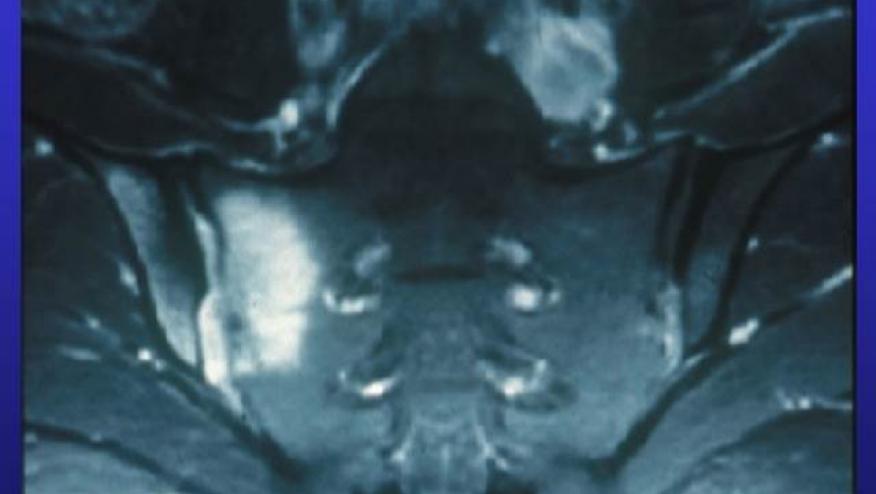POSTURE Study: Apremilast Fails in Ankylosing Spondylitis Save

ClinicalTrials.gov has listed the results of the POSTURE study, a large randomized placebo-controlled trial wherein apremilast was found to yield no benefit (compared to placebo) in treating ankylosing spondylitis (AS) (32.5% vs. 36.6% ASAS20 at week 16) patients. These findings make it unlikely that Celgene will pursue AS as an indication for apremilast.
This was a 490 patient trial wherein active AS patients were randomized to receive placebo, Apremilast 20 mg or apremilast 30 mg bid for 24 weeks, with a planned 5 year open-label extension. The primary endpoint was the percentage achieving an Assessment of Spondyloarthritis ASAS20 response at week 16 (comparing those on placebo and apremilast 30 mg BID).
|
ASAS20 Response at Week 16 |
|
|
Placebo (n 164) |
Apremilast 30 mg (n 163) |
|
36.6% |
32.5% |
|
P =0.438 |
|
While many of the details have yet to be published or presented, the primary endpoint was not met. Dropouts were low (10-15%) and nearly 30% of each group had an early exit a week 16. Interestingly these patients had a wide diversity in disease duration with 42% having less than 5 years disease duration and 38% had > 10 yrs. disease duration. It is not known how many of these patients had axial only disease or how many had peripheral arthritis or enthesitis.
The toxicity profile appears to be in line with that reported in other trials, including 9-12% diarrhea on apremilast and 3% on placebo. Overall adverse events were not different between groups, but the 30 mg apremilast patients had more serious adverse events (6 vs. 1) and adverse events leading to drug withdrawal (12 vs 6) than patients on placebo.
Apremilast is a phosphodiesterase-4 inhibitor (PDE-4) that has been approved for the treatment of moderate to severe plaque psoriasis or active psoriatic arthritis in adults. In RCTs it was shown to yield 32-41% ACR20 responses in PsA and 29-33% PASI75 responses in psoriasis patients after 16 weeks of therapy.
The drug failed as add-on therapy in a phase II rheumatoid arthritis patient trial where in methotrexate incomplete responders received either placebo, apremilast 20 mg or 30 mg bid (Citation source http://buff.ly/2eO4qYo). After 16 weeks, apremilast (28-33%) was no better than placebo (34%) at achieving an ACR20 response.
An early pilot study of 36 active, NSAID-treated ankylosing spondylitis (AS) patients showed a nonsignificant trend toward improved BASDAI and BASMI scores compared to placebo. Interestingly there was a significant decline in biomarkers of bone biology (RANKL, sclerostin) in the apremilast treated cohort. (Citation source: http://buff.ly/2dYzjtR)
In summary, apremilast may be effective in psoriatic disease, but does not have any proven efficacy in anklyosing spondylitis that would support its use and make its future study unlikely.
The data tables for the POSTURE study are shown below:
|
Baseline Measures |
Placebo (n 164) |
Apremilast 20 mg (n 163) |
Apremilast 30 mg (n 163) |
Total (n 490) |
|
Mean Age (yrs) |
44.0 |
45.2 |
44.8 |
44.7 |
|
Male |
124 |
121 |
107 |
352 |
|
AS duration (yrs) |
10.39 |
11.06 |
10.31 |
10.59 |
|
≤ 2 yrs |
41 |
48 |
40 |
129 |
|
> 2 to ≤ 5 yrs |
29 |
23 |
26 |
78 |
|
Ø 5 to ≤10 yrs |
33 |
29 |
33 |
95 |
|
> 10 yrs |
61 |
63 |
64 |
188 |
|
|
Placebo |
Apremilast 20 mg |
Apremilast 30 mg |
|
STARTED |
164 |
163 |
163 |
|
Received Treatment |
164 |
163 |
163 |
|
Completed Week 16 |
150 |
151 |
144 |
|
Early Escape at Week 16 |
51 |
49 |
49 |
|
Completed Week 24 |
145 |
147 |
138 |
|
Dropouts |
19 |
16 |
25 |
|
Adverse Event |
6 |
7 |
12 |
|
Lack of Efficacy |
3 |
2 |
5 |
|
Non-compliance with study drug |
1 |
1 |
0 |
|
Withdrawal by Subject |
8 |
3 |
5 |
|
Lost to Follow-up |
1 |
2 |
0 |
|
Protocol Violation |
0 |
0 |
3 |
|
Unspecified |
0 |
1 |
0 |
|
Adverse Events |
Placebo |
Apremilast 20 mg |
Apremilast 30 mg |
|
Overall Participants |
164 |
163 |
163 |
|
Any Treatment Emergent Adverse Event (TEAE) |
82 |
89 |
85 |
|
Any drug-related TEAE |
21 |
43 |
49 |
|
Any severe TEAE |
0 |
2 |
5 |
|
Any serious TEAE |
1 |
3 |
6 |
|
Any serious drug-related TEAE |
0 |
0 |
3 |
|
Any TEAE leading to drug interruption |
13 |
12 |
13 |
|
Any TEAE leading to drug withdrawal |
6 |
9 |
12 |










If you are a health practitioner, you may Login/Register to comment.
Due to the nature of these comment forums, only health practitioners are allowed to comment at this time.